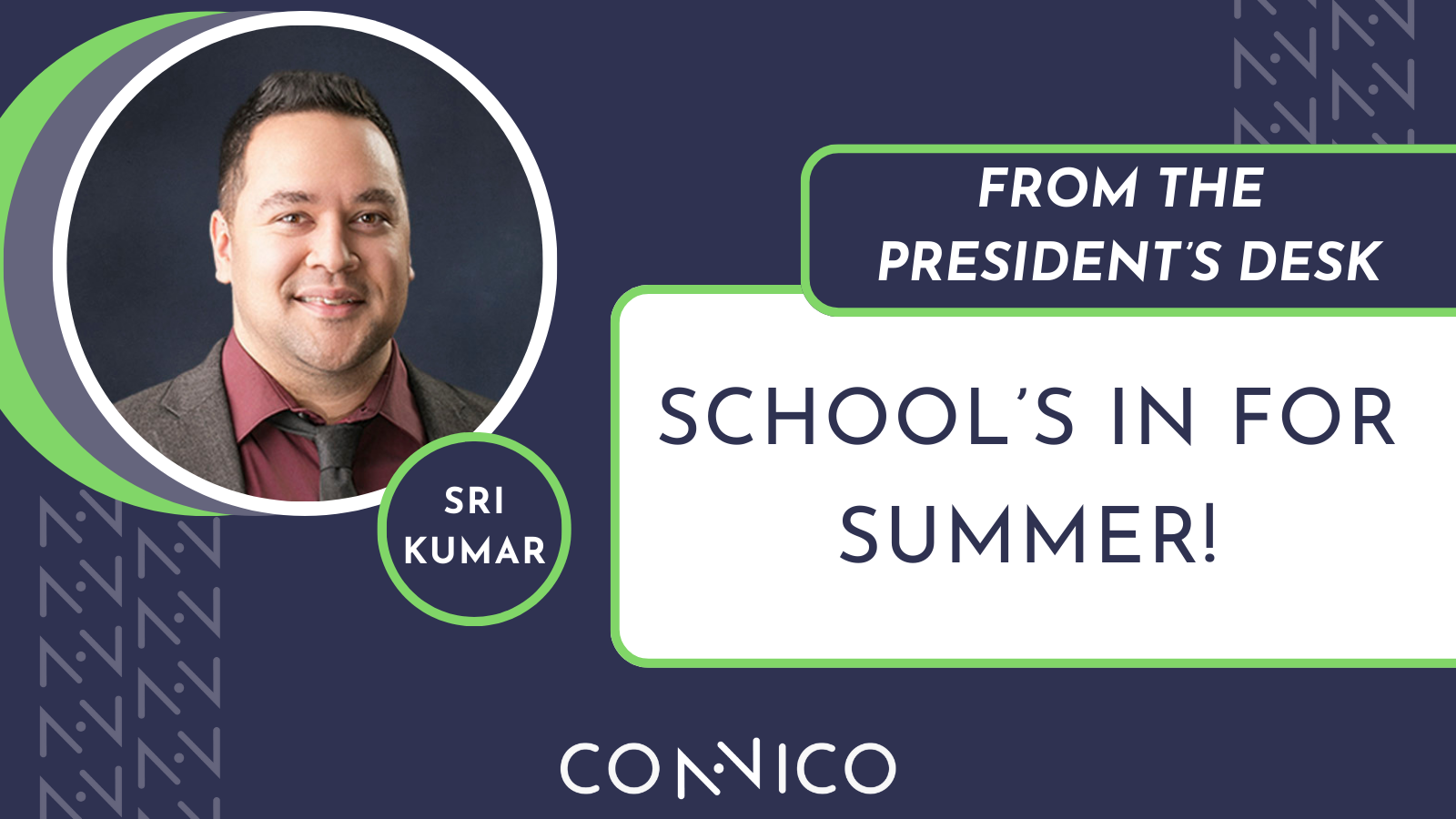From the President’s Desk: School’s IN for summer!

Fall means the same thing to all of us, I think … the reinstatement of school zones on the commute to work! Right?
Really, fall is all about change, including the start of the school year. Early bedtimes, packed lunches, and after-school practice: it’s a series of routines you either remember fondly or are still living! There’s one gigantic secret about school, though. It’s a secret that teachers can’t tell, parents won’t tell, and that kids – under any circumstances – cannot BE told. It’s a secret most adults aren’t aware of, simply because we don’t spend a lot of time reflecting on our school years. We just keep doing what generations before us did: using school as an arcade to collect enough tickets for the “Big Prize.”
The big secret is one I’ve become closely acquainted with because I remember almost everything I learned in school. At work trivia events, I’m the first to raise my hand. Did you know one of the “world’s first crossroads” was Constantinople, and it wasn’t always called that? When someone can’t name the pair of scientists who developed the same solution to the same problem at the same time, independent of one another, it’s easy for me to recall both Newton and Leibniz (and their first names!).
My trivia knowledge aside, remembering test answers doesn’t make you popular – because people are aware that these facts don’t usually affect the world around us. HERE is the big secret: the things you are taught in school have almost no use.
Even if you don’t know all these answers, you likely know the value of an education. Wherever you attended, if you were lucky enough to attend school, you learned something that helped you grow into a functioning adult. So, if you don’t remember what you learned in class, what was the value of getting up every morning?
The truth is, school doesn’t teach you times tables or science facts. Instead, you learn life lessons – and they are lessons you won’t get anywhere else. The nature of school teaches you to adapt to a routine, especially one you don’t like. It teaches you to socialize, meet deadlines, improvise, share, and navigate complex problems. Critically, it teaches you that you can face the unknown.
While you think you’re memorizing capitals of foreign countries, you’re actually developing a strategy for negotiating foreign situations, preparing yourself to deal with unforeseen circumstances. While your teacher discusses blends of various elements from the periodic table, you’re actually working on blending personas, enabling you to network – or survive – across multiple social environments. While you sit through lectures on the consequences of colonization, you’re discovering that your actions have consequences, whether you realize the consequences at the time or not. These are the lessons you can only get inside those brick walls, which is why school is such a critical part of development.
I’m sure anyone reading can easily recall the even tougher lessons learned at school: we have to lie in the bed we make for ourselves, life is not fair, or the “good guys” do not always win. But I hope you can also remember the lessons that were inspiring: the impact we create when we follow through on a commitment, how others respond when we offer help, what we can accomplish when we work hard, how we feel when we are seen as a leader, the power of praise, or the beautiful result when we remove our own biases from our ways of thinking.
It's time for us to be honest about what “back to school” means. School teaches you to be a better human. When the bell rings, the most valuable thing we’ve learned is who we really are inside. That’s a lesson worth hitting the books for.
P.S. Bonus trivia round! Try answering the three school-knowledge questions below; answers to follow. No cheating, and let me know how you do!
- Who authored “The Very Hungry Caterpillar”? First grade reading, don’t fail us now!
- How quickly can you recall 11 multiplied by 12?
- You might be able to name the year of the Louisiana Purchase, but what year was the Missouri Compromise – and which came first? Try phoning your eighth-grade history teacher for this one.
- What metals make up the alloy brass? Taking it back to tenth-grade science.
Answers (with content you did NOT learn in school) include:
- Eric Carle (who is also the book’s illustrator, and appeared on Mister Rogers' Neighborhood to detail how its art was made with tissue paper)
- 132 (a trick for this: when multiplying 11 by numbers between 10 and 18, just add the digits and slide the sum into the middle: 1+2=3, so 12x11=132. Turns out, numbers like to show off too.)
- 1820 (I’ll let you figure out which of the two states this references, but if you ask your gnomish friend MIMAL, one obviously couldn’t have happened without the other!)
- Copper and Zinc. Like peanut butter and jelly, but with better conductivity.



